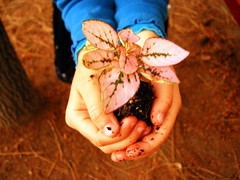

Composting can be tricky, it can be fun, it can be messy, and it can be a great project for kids...and it most definitely is ESSENTIAL for the garden. So far we have one outstanding compost area set up with a stacking composter, a tumbling composter and a worm house, aka vermicomposter, donated by the Gibbons-Croft family and the Green family...these will help our garden thrive! We are working on setting up the same kind of thing over in the 3-8 garden but any help or donation in this area would be great!
Here's what we would like to happen to keep our compost healthy. We would like each classroom to have a pail for collecting scraps from kids lunches. Once a week those scraps can be tossed into the composter! Then we can water and turn the compost. We have included "watering the compost" twice a week to the list for the garden liasons and volunteers posted on the white board in the garden. A whole watering can should do the trick. The worms also need watering but not as much or as often.
What to Compost: melon rinds, carrot peelings, tea bags, apple cores, banana peels - almost everything that cycles through your kitchen. The average household produces more than 200 pounds of kitchen waste every year and we can successfully compost all forms of kitchen waste. Egg shells are a wonderful addition, but decompose slowly, so should be crushed. Coffee is an excellent addition to compost...the kids can bring it from home...many coffee shops also donate their grounds! And if your class participates in cooking projects, the veggie scraps are appreciated!
What NOT to Compost: No dairy products, and high-fat foods like salad dressings and peanut butter, can present problems ...also NO MEAT or CHEESE!
Garden Refuse can also be composted. All of the spent plants, thinned seedlings, and deadheaded flowers can be included. Most weeds and weed seeds are killed when the pile reaches an internal temperature above 130 degrees, but some may survive. To avoid problems we shouldn't compost weeds with persistent root systems, and weeds that are going to seed.
Managed Composting involves active participation, ranging from turning the pile occasionally to a major commitment of time and energy. We can get fully cooked and ready-to-use compost in 3-4 weeks if we water, feed, turn and tend our compost!
 Worm Composting (or vermicomposting) is different than traditional composting. Worm composting is a process that uses red earthworms, also commonly called redworms, to consume organic waste, producing castings (an odor-free compost product for use as mulch), soil conditioner, and topsoil additive. Naturally occurring organisms, such as bacteria and millipedes, also assist in the aerobic degradation of the organic material.
Worm Composting (or vermicomposting) is different than traditional composting. Worm composting is a process that uses red earthworms, also commonly called redworms, to consume organic waste, producing castings (an odor-free compost product for use as mulch), soil conditioner, and topsoil additive. Naturally occurring organisms, such as bacteria and millipedes, also assist in the aerobic degradation of the organic material.
Vermicomposting is especially useful for processing food scraps, since the worms consume the material quickly and there are fewer problems with odor. Worm composting does not generate temperatures high enough to kill pathogens. For this reason, vermicomposting is more appropriate for food, paper, and yard waste. Food scraps should be chopped or shredded for faster degradation. Unprocessed materials can be used in vermicomposting, but the time required for complete degradation of the organic waste is generally six months or longer.
It is up to our Teachers and Garden Liaisons to decide how into composting they would like to be...and we have more links and info for you as well as workshop information! If one or two teachers get inspired, certain classes could take over composting and do all the collection, temperature-taking, turning, and general maintenance. Other school gardening programs have had good results dealing with composting this way. There is a huge amount of curriculum and lesson plan's information out there for those of you that are interested!








No comments:
Post a Comment